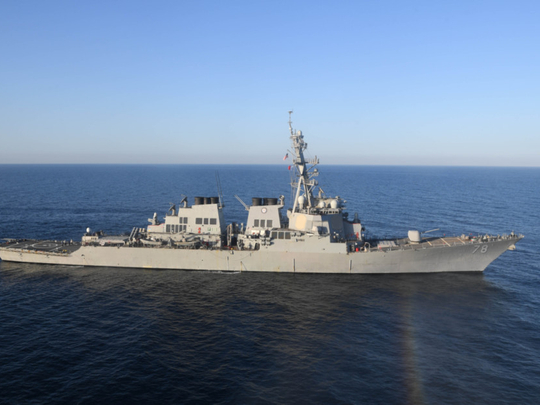
US President Donald Trump’s decision to launch a Tomahawk missile strike on a key Syrian airbase sent a strong message to the Damascus-based regime and got the world talking about the new phase of the six-year-old war that has left millions displaced and nearly half a million people dead.
“President Trump inherited the Syrian catastrophe from Barack Obama, and his initial instincts were to accept the awful status quo. But Bashar Al Assad’s latest chemical attack has galvanised his administration to think anew, and Mr Trump’s decision to launch a retaliatory missile strike is an important first step to save lives, enforce global order, and improve the strategic outlook for the US and its allies,” the Wall Street Journal wrote in a sharp editorial that contrasted his predecessor’s lack of action in the Syrian theatre.
The Washington Post noted, “In Syria, the regime of President Bashar Al Assad unleashed toxic nerve agents that killed innocent civilians, including children whose corpses were a shocking testament to the awful toll of the war. Mr Trump’s first instinct was to blame former president Barack Obama, saying the Syrian attack was ‘a consequence of the past administration’s weakness and irresolution’. Leave aside for the moment that Mr Trump repeatedly argued against military action in Syria several years ago when Mr Obama was mulling the response to his own ‘red line’ against the use of chemical weapons. What is most interesting now is how Mr Trump responded to the new attack. In the Rose Garden on Wednesday with Jordan’s King Abdullah II, Mr Trump acknowledged that ‘it is now my responsibility’ and he added, ‘It crossed a lot of lines for me. When you kill innocent children, innocent babies — babies, little babies — with a chemical gas that is so lethal — people were shocked to hear what gas it was — that crosses many, many lines, beyond a red line. Many, many lines.”
The Post went on to warn the world about the reactions on the attack. “This raises the question of how Mr Trump intends to make good on his word. The Syrian war, a cauldron of complexity and misery, is not an easy knot to untie. Thursday night, the United States launched about 50 cruise missiles at a Syrian military airfield in response to the chemical attack. This is the first direct strike on Syrian forces since the civil war began six years ago. The next steps will have to be carefully considered so a spasm of reaction does not simply make things worse on a battlefield where Russia and Iran are backing the Syrian regime.”
The Guardian pointed out the broader ramifications of the missile strike, adding, “Moscow has no great love for Mr Al Assad, but does not see an obvious alternative; replacing him may become less likely, since it will not want to appear to have been strong-armed. Rex Tillerson’s meetings in Russia may offer indications of the Kremlin’s response to a more assertive administration. Trump’s willingness to press the button may make North Korea more cautious and Chinese president Xi Jinping, who was dining at Mar-a-Lago as missiles soared, may consider more pressure on Pyongyang. But he will not like the attack’s timing, nor want to look weak by offering significant concessions in the short term. On its own, this action is unlikely to stop the sustained and systematic crimes against humanity. There were reports of further bombing at the Idlib site.”
The newspaper surmised that Al Assad might be deterred from resorting to chemical warfare. “It may deter the regime from using sarin again and from indulging in the most public excesses of viciousness. It may discourage others from employing such weapons. Those are important goals — however partial and imperfect.”




_resources1_16a31069e4e_small.jpg)







